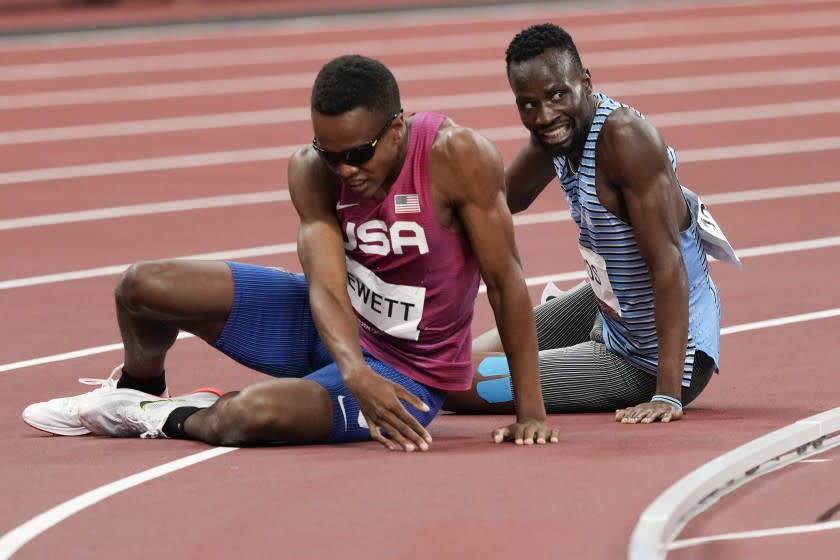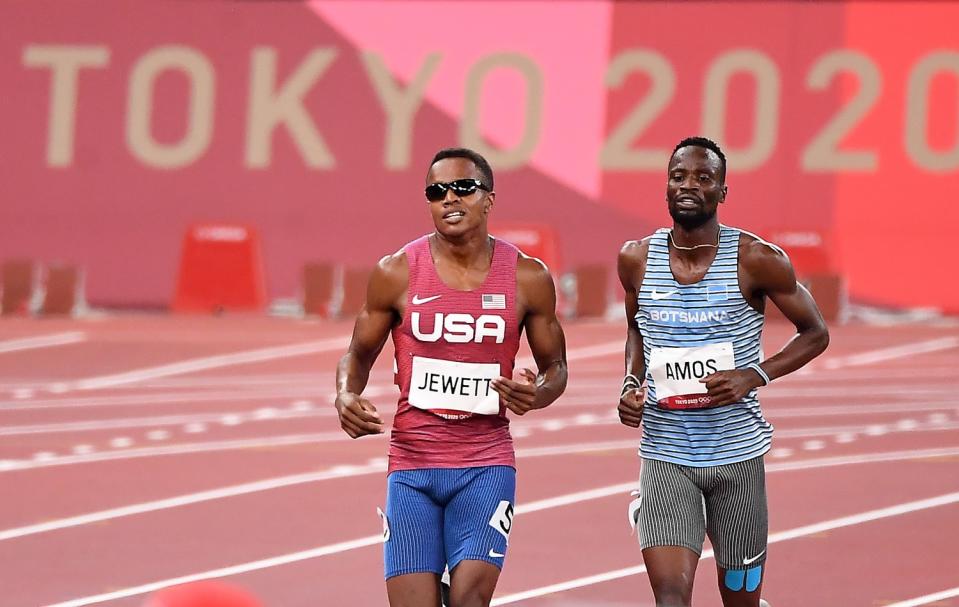U.S. runner Isaiah Jewett falls in 800-meter semifinals, then embodies the Olympic spirit

- Oops!Something went wrong.Please try again later.
Isaiah Jewett emulates anime superheroes.
He watches them, quotes them. He tries to live by their credo and example.
Jewett has said that lessons learned from Japanese animation cartoons fueled his drive and helped him become a first-time Olympian.
In the immediate aftermath of a devastating setback, Jewett demonstrated the embodiment of the superhero — and the Olympic spirit — on Sunday night at Olympic Stadium.
After having their races cut short, Isaiah Jewett and Nijel Amos showed the ultimate sportsmanship. #TokyoOlympics pic.twitter.com/71lwSbY0x5
— #TokyoOlympics (@NBCOlympics) August 1, 2021
On a night when Lamont Marcell Jacobs of Italy won the men’s 100-meter race and Yulimar Rojas of Venezuela established a world record in the women’s triple jump, Jewett left a memorable impression.
It did not begin as the Olympic moment that Isaiah Champion Jewett dreamed of as a child when he was trying to keep up with his older sisters, Victorya and Olympia. Or when he was losing races and failing to make the roster of other sports teams.
But Jewett’s actions after a fall in the men’s 800-meter semifinals will endure.
Jewett, the NCAA 800-meters champion from USC, was in the third position and Nijel Amos of Botswana the fourth as the racers approached the final turn. A moment later, both fell hard on the track. Jewett helped Amos to his feet, shook his hand and then put his arm over his shoulder as they finished the race.

“I was super frustrated, I was so mad because I felt like I had a chance,” Jewett said, “and I learned from like from all the superhero anime I watch, regardless of how mad you are, you have to be a hero at the end of the day.
“And that was my version of trying to be a hero, standing up and up and showing good character even if it’s my rival or whoever I’m racing, or if anything happened.”
Immediately after the race, it was not clear what caused the runners to fall.
Jewett said it felt as if he had been hit in the back of his heel, which threw off his stride and caused his legs to tangle.
“I just fell from there, from what I remember at least,” he said. “I just remember hitting my head, too.”
Amos offered an immediate apology, Jewett said.
“He’s like, ‘Sorry,’” Jewett said. “I said, ‘It’s OK, man.”
Amos said he did not know what happened.
“I found myself down,” he said, “But at the end of the day, that’s the sport, and that's the 800. That’s what makes it interesting, isn’t it?”
Jewett said a protest had been filed and that he was “very hopeful” that officials would consider his case and place him in the final. But according to the Olympics information website late Sunday, Amos was advanced to the next round by the referee. Jewett was not.
“This is the 800, so it could end wrong,” Jewett said before the ruling on his protest. “But I’m super blessed because not a lot of people got to be here.
“I have to live in that moment, not the moment that just happened. Even if I get another chance to run, I’m just super blessed that I’m here and even able to talk to [reporters]. It’s amazing like I’m able to go onto this stage and show you guys this is me.
“So that’s just what I want to continue to do, to show who I am. If it wasn’t today, I’ll try again tomorrow. But that’s not going to stop me from trying to be a hero.”
Not finishing the race Sunday, even after falling, apparently was not an option.
“That’s what heroes do,” Jewett said. “They show their humanity through who they are and show that they’re good people.”
But even before the ruling on his protest, Jewett lamented the lost chance to finish the semifinal at full speed.
“I felt like I had a really good chance at running in the final and that’s just super devastating because I felt like I was starting to show people who I am,” Jewett said. “And now, of course, I got to show them here and I’m super blessed for that.
“But now it’s like in the final, where I felt I was going to show everyone in the world, I lost that opportunity.”
Jacobs won the 100 in 9.8 seconds, becoming the first man other than Jamaica’s Usain Bolt to win the gold medal in the event since 2008. American Fred Kerley won silver in 9.84 seconds and Andre De Grasse of Canada won bronze, finishing in 9.89 seconds.
Rojas leaped 51 feet 5 inches to win the gold medal, breaking the record of 50 feet 10¼ inches that Ukraine’s Inessa Kravets had set in 1995.
This story originally appeared in Los Angeles Times.

